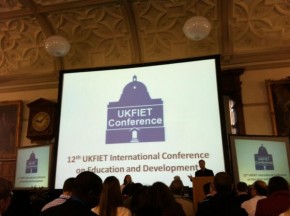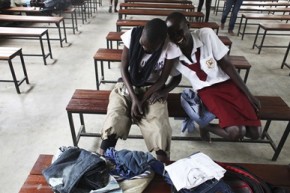
I almost broke into a cold sweat entering the historic Oxford University Examination Schools for the first time in 20 years, memories of stumbling through a viva (oral examination) grilling and multiple 3 hour written papers on long forgotten inorganic chemistry flashed through my mind. This time I entered for the slightly less daunting biennial UK Forum for Internatioanl Education and Training (UKFIET) Conference, a very large gathering of academia, researchers, practitioners, NGOs and funding partners that focus their attention on international development of the education and training sector.
The opening plenary address was given by Ms Amina Mohammed, Special Advisor of the Secretary-General of the United Nations on Post-2015 Development Planning and highly pertinent to the conference theme: Education and Development Post 2015 Reflecting, Reviewing, Re-visioning. Amina spoke with passion on the complexities of steering a diverse array of international leaders and institutions down a path way that should set a new agenda for the world to reduce poverty and adopt principles of sustainable development.
She knows better than most the scourges of conflict, inequality, corruption and environmental degradation and the demand for better governance, having advised on the use of US$ billions of debt relief on MDG related initiatives in Nigeria. I witnessed at first hand whilst working there the enormity of these challenges, Nigeria is thought to be the country that will have the most out of school children on the planet come the 2015 MDG reckoning. The power of an Open Data revolution being unleashed to promote transparency. Low cost technology and mobile communications have enabled approaches and applications that were inconceivable when the MDGs were set: mobile money transfer, e-learning, crowd-sourced monitoring et al.

The conference then split into a huge array of parallel sessions, roundtables and symposia, with papers and presentations with titles as diverse, or enigmatic as: 'Neuroscience and the post-2015 agenda', to 'Raising University Quality in the Land of the Unexpected'. I managed to attend some interesting sessions from previous places I'd worked, how the Education Sector Support Programme In Nigeria (ESSPIN) programme was demonstrating the impact of school improvements in Nigeria and the how the archaic phenomena of kidnapping teenage girls for marriage in parts of the Ethiopian still impeded progress. I was privileged to join a number of colleagues from DFID in launching our new Education Position policy paper and a paper 'Back to the Future: The evolution of DFID’s education programme – what have we learnt and where are we going' in keeping with the conference theme.
Given DFID's central role in supporting or co-financing a fair chunk of the research and evidence at the conference we received a fairly good reception. Sir Ian Diamond (a recent head of the UK Economic and Social Research Council) was on hand to give his support for DFID's growing programme of evidence and research in education. He stressed its importance both as a public good and as a guiding factor in the support provided to education in developing nations. The case studies my colleagues and I presented on India, Rwanda and Tanzania made the point that DFID's programme are shifting: with more on post primary schooling and the use of novel 'results based' finance instruments. In the future DFID's role will increasingly be around providing 'know how', as bilateral aid diminishes in size relative to direct investment and remittances to low income countries.
It would be no surprise that DFID's approach does not go unchallenged at such events. A paper on low cost private education in Pakistan highlighted potential flaws in data used to target beneficiaries and questioned very low payments made to young women contracted to teach in such schools. This challenge function I believe is extremely healthy. Without it new approaches risk being undermined. Overall it was a pleasure to participate in UKFIET and network with such a committed and diverse range of practitioners and researchers whom rarely meet in person.

I'm already looking forward to the next conference in two years' time, when hopefully the vision for education will be clearer. If the education MDGs were all about school access, a focus on 'learning for all' seems to be an increasingly strong horse to back. The Learning Metrics Task Force recent report Towards Universal Learning is perhaps the most influential recent paper and will be presented at the forthcoming sessions the UN General Assembly. It outlines a series of recommendations to use existing assessments of learning as well as innovative, new measures to improve learning opportunities and outcomes for all children and youth.

6 comments
Comment by Victor Wooten posted on
The only thing in life achieved without effort is failure.
Comment by Ishtiaq Ahmad Khan posted on
DFID's role in the Pakistan's education development is really appreciative. I was a part of DFID's 5-years's Strengthening Deccentralised Local Governments in Pakistan and worked in the Pilot City District Government Faisalabad Punjab. We had done a lot in the Education sector through remarkable team of local and international educationists. However, here in Pakistan, there is a serious matter with 'Sustainability' of the project. In my view, DFID should also think on the parameter of taking 'Political Willingness and Assurance' after the project completion in order to ensure continuity of the Project Outputs and Outcomes. Thanks
Comment by Joseph Payne posted on
The recently held 10th Language and Development Conference, organised by British Council South Africa, also had a nominal focus on the post-2015 development agenda and, unsurprisingly, a lot of the sessions focussed on education or, more specifically, languages of instruction. (Some video clips from participants and a number of presentations/papers available at http://www.britishcouncil.org.za/languageconference/resources)
I wonder if and how issues of language of instruction featured in the UKFIET...
Comment by Ian Attfield posted on
UKFIET had over 150 papers and sessions running, a few specifically focused on Language of Instruction, but this was not a conferene theme.
One was by a real expert in the field of African languages, Barbara Trudell of SIL Africa with a focus on the Maasai in Kenya.
Another on Tanzania and it's monlolinguistics policy (Swahili and then English in secondary) was presented by Anjum Halai and Pauline Rea-Dickens of the Aga Khan University for Educational Development East Africa. The research programme http://www.bristol.ac.uk/spine may be of interest and is referenced in the latter.
Comment by Berk posted on
Education and Development Post 2015 Reflecting. British Council South Africa, also had a nominal focus on the post-2015 development agenda and it is useful informative post.
http://www.courseworkspot.co.uk/do-my-coursework/
Comment by Holly posted on
Education Blog and website, it seems like these organizations have been just pouring funds and loans to make sure the 2015 education Millenium goals are satisfied. Your suggestion to oversimplify the goal to “Basic Life Skills” needs to backed up with statistics that it will generate results required. There has been so many failures, mistakes, misuse and waste of funds, that these well-wishing organizations can not afford to go wrong any more.